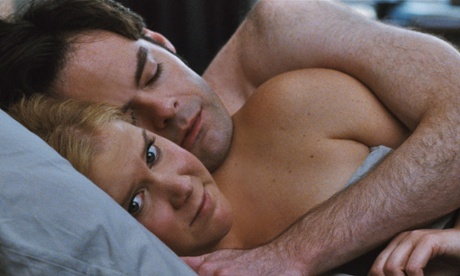Romcoms developed by standup comedy stars usually work like this: the jokes and the observational material are front-loaded into the first 15 minutes. But once the wheels of narrative need to start moving, the comedy gets ground out. It’s something to do with needing to identify with the characters, to get on board for the upcoming happy ending and leave behind the cynicism and wrongness that provided the ecosystem for jokes.
The Big Sick isn’t like that. Or not exactly. It’s a stranger-than-fiction date movie of enormous charm and sweetness, which plunges you into a deliberate seriousness after the setup. There is a sudden stab of anxiety at the point where most romcoms begin their semi-intentional slide away from irony. The film is based on the true story of its co-writers, who are a married couple: Pakistani-American standup and actor Kumail Nanjiani and the white comedy writer-producer Emily V Gordon. Nanjiani comes from a family background where arranged marriage is the way things are done. He avowedly had a hard time admitting to his parents he had fallen in love with Gordon, and also admitting to Gordon that she was still a secret from his folks. And then, when their relationship was reaching a terrible crisis, Gordon fell ill with a mysterious infection and had to be put into a medically induced coma. Nanjiani had to wait it out in a hospital vigil with her parents.
Nanjiani plays Kumail, a version of his younger self – a part-time Uber driver and wannabe standup star, cracking gags from his perch somewhere along the spectrum of comedy geekiness. Emily is played by Zoe Kazan. She starts off by sort of heckling Kumail during his standup and winds up having a romance with him. Kazan gives a very winning performance, combining her doe-eyed and rather cherubic beauty with a plausible mix of intelligence and vulnerability, the medical dimension to which reminded me of her appearance in Bradley Rust Gray’s The Exploding Girl (2009).
Kumail’s ebullient father, Azmat (Anupam Kher), and his controlling mother, Sharmeen (Zenobia Shroff), are very engaging, as is his bleary brother, Naveed (Adheel Akhtar), who warns Kumail that departing from tradition might cause his mother to “ghost” him, in the 21st-century social media manner. Interestingly, Emily’s parents are represented more intimately and irreverently, and with less comedy about cultural stereotypes. They are Terry (Ray Romano) and Beth (Holly Hunter), who are unsure why, in their hour of trial, they need to be up close and personal with the guy whose behaviour may have triggered their daughter’s condition. The dance of seduction is really between Kumail and this middle-aged white couple. They are the proxy affair, the inter-generational romance. It is almost like When Harry Met Sally…, if one of the old couples being interviewed turned out to be Meg Ryan’s parents and Billy Crystal had to win their hearts.
The Big Sick is hardly revolutionary. It is essentially a rather conservative movie in which rules and conventions, although challenged satirically, are not actually broken in the course of the story. There is no cynicism here and certainly no place for gags about the Smiths’ Girlfriend in a Coma, although Nanjiani and Gordon surely considered it. (“There were times when I could have murdered her / But you know I would hate anything to happen to her.”)
Judd Apatow is the movie’s producer and guiding spirit. He was reportedly initially entranced by Nanjiani and Gordon’s true story, but also perhaps by its resemblance to a couple of his own works. Emily’s dad is not unlike Seth Rogen’s dad in Knocked Up, played by the late Harold Ramis – a middle-aged guy in whom you can still see the slimmer, poorer, more earnest college kid. And The Big Sick is structurally similar to Apatow’s underrated Funny People, in which a comedian is suddenly hit with a medical crisis that crystallises his growing suspicion that life may not actually be very funny. Like Funny People, there are scenes showing comics hanging out together backstage, supportive to some extent but also competitive and paranoid. The biggest single laugh comes when an awful comic asks for specific help with improving a certain gag; the advice involves a career change.
Photos over the closing credits show Kumail and the real Emily, and it’s impossible not to yearn for a documentary that might tell us more candid stuff, particularly about Kumail’s parents and how they came to terms with the relationship. None of that stops this from being a hugely enjoyable, lovable comedy.











